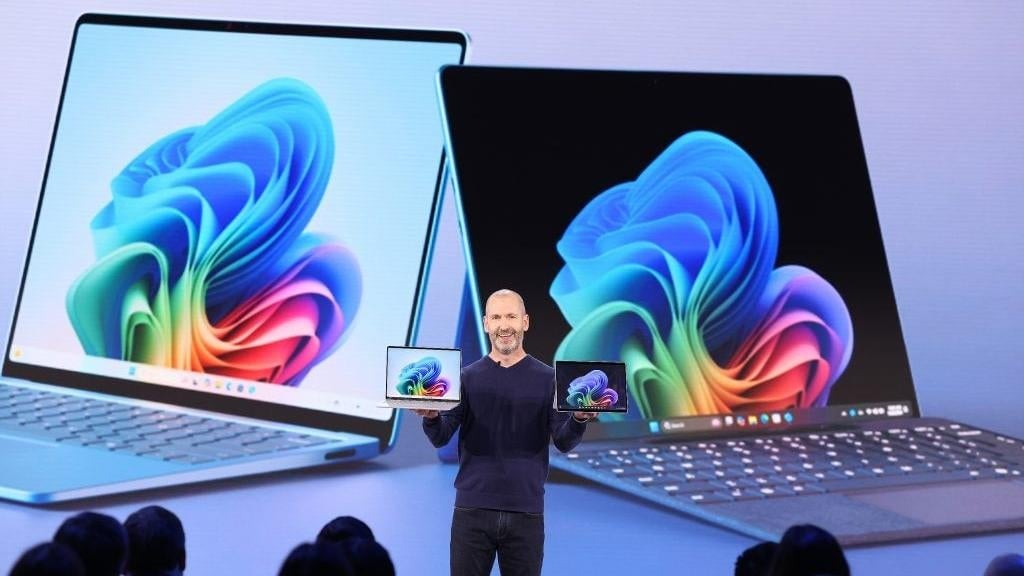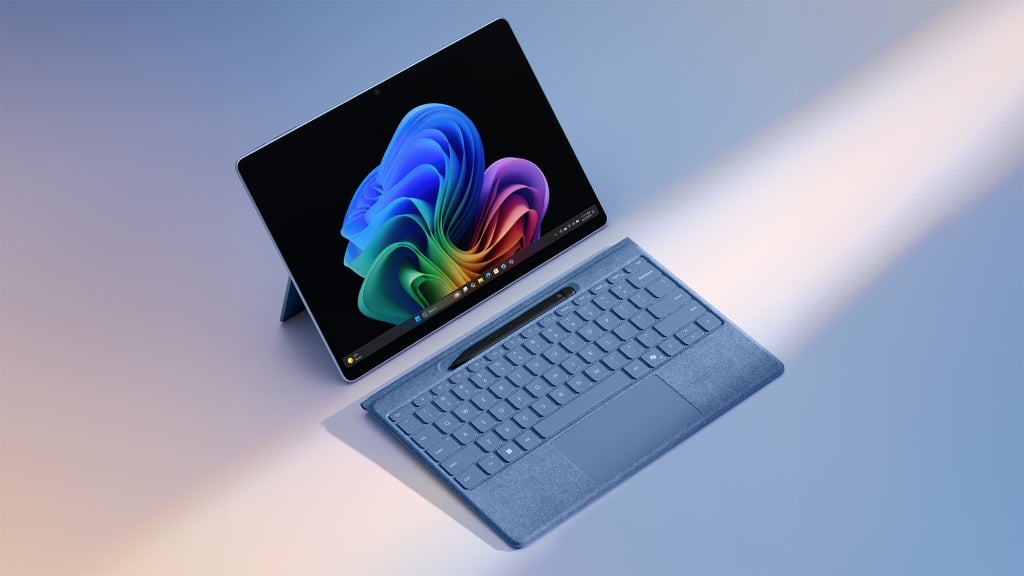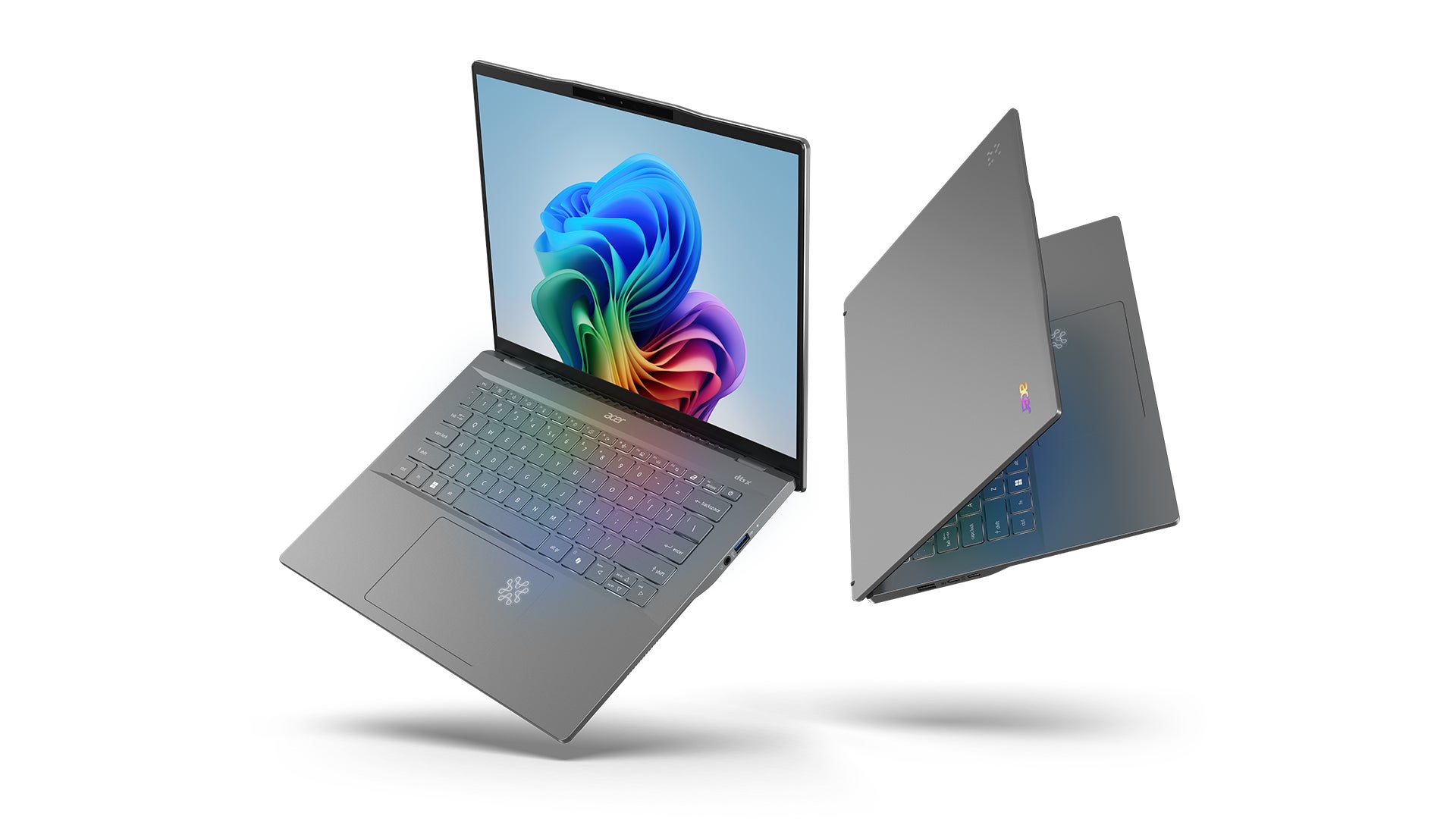Microsoft's new AI hardware has Apple in its crosshairs
A ton of AI-centric software is coming to Copilot, and Microsoft says the new PCs should be able to handle “small language models” on these Copilot+ devices.

Microsoft smells blood in the water, and it seems to be exclusively gunning for Apple’s latest ultra-thin laptops and iPads with devices sporting all-day batteries and ARM-based processors that boast better performance with better energy efficiency.
Suggested Reading
Oh, and AI. Lots and lots of AI. Practically an avalanche of AI exhortations.
Related Content
The Microsoft Surface 2-in-1s haven’t exactly stood out from the pack in recent years, but that could change with the Surface Pro sporting the Qualcomm Snapdragon X Elite chip. The smaller version weighs in at just under two pounds, and the thinner bezels allow for more screen real estate. Microsoft claims the new version is 80% faster than the last generation, and yet it will have 14 hours of battery life in video playback. You also have the option for an OLED or LCD screen.
There’s also a new Surface Laptop Go that also sports Qualcomm’s latest chips, but just as last year’s devices got a fair bit more pricey, these latest Microsoft-brand laptops aren’t getting any cheaper. The 13.8-inch Pro starts at $1,000, while the 15-inch goes for $1,200 at the low end. However, unlike Apple’s latest laptops, which only have 8 GB of RAM, the Surface Pros have 16 GB.
There’s going to be new ARM64 implementations of Windows 365. However, there will still be some apps that don’t support an ARM version. The company is releasing a new emulator called Prism that should be able to handle older apps that don’t yet have an ARM version. Still, while you can easily run Chrome or Adobe products on a Copilot+ PC, you could eventually come across an app that requires more effort than you might be used to on modern plug-and-play x86-x64 Windows devices.
Copilot+ PCs Will Run ‘Small Language Models’

This would already seem like a strong start, but Microsoft can’t stop, won’t stop talking about AI. A ton of AI-centric software is coming to Copilot, and Microsoft says the new PCs should be able to handle “small language models” on these Copilot+ devices. Microsoft claims the PCs are 20 times more powerful at non-gaming tasks compared to past 2-in-1s and many times better at running AI-centric tasks, in this case, processing a simplified AI workload. Does that translate into running GPT-4o’s voice capabilities on-device? Not by half, but there will be some AI capable of working on-device rather than the cloud. It remains unclear whether Copilot itself is one of those.
Instead, these “small language models” are supposed to be persistent AI running in the background on these new devices. Two of the big ones to drop this year are Recall, a kind of always-on timeline of stuff you did on your PC, and some on-device AI image generation in Cocreator. There’s also a live captions feature that should be able to generate text from audio in more than 40 languages.
So the “small language model” is just marketing speak for smaller AI programs capable of running on the device rather than a distant data center that requires quite a lot of GPUs, power, and water to run every day. However, it seems for now that the Copilot chatbot itself will remain a cloud-only operation.
What is the AI Performance on the Copilot+ PCs, and Does it Matter?

Asus, Acer, Dell, HP, and other OEMs all revealed their latest slim, portable laptops Monday in preparation for tomorrow’s Microsoft Build developer conference. These laptops will sport either the Snapdragon X Elite or Snapdragon X Plus, two AI-centric chips that are supposed to power what’s going to become a new line of ARM-based Windows PCs. The Elite comes stock with a 12-core CPU that goes up to 3.8 Ghz as well as the built-in Adreno GPU with up to 4.6 TFLOPs on the top end. Qualcomm has made major claims that the chips beat Intel’s latest Ultra 7 and Ultra 9 CPUs in performance at lower power.
The chipmaker has even claimed it can beat Apple’s M3 chip seen in the latest MacBook Airs and baseline MacBook Pros in multi-thread CPU performance benchmarks. We’ll still need to get our hands on them to see if those claims hold up. However, the company’s big claim to fame is the 45 TOPS (trillions of operations per second) of neural processing performance in both chips in the Snapdragon X lineup. This is compared to Intel’s latest AI-centric chips, which could do 34 tops in total, with 11 stemming from the dedicated NPU.
How much that AI capability matters all depends on how much AI is handled on-device and which apps will utilize Copilot+’s capabilities. As a reminder, the last time Microsoft tried an ARM-based Surface with the Go 3, it didn’t go so great, with a performance that really couldn’t match competitors’ or even Intel’s chips. Plus, even with the power and efficiency of the latest Qualcomm chips, these Copilot+ PCs aren’t going to be great for gaming, at least to start. That’s all due to the lack of support from game developers compared to the x86-based CPUs from Intel and AMD.
So, if these devices prove as capable as the claims say, they’ll only really be useful for daily productivity tasks. There’s nothing wrong with that, but Apple already has its locked-down ecosystem under the M-series chips.
Acer’s New Swift 14 AI Laptop Literally Glows With Excitement Over AI

The big computer manufacturers are out in force supporting Windows’ AI hardware push. Gizmodo has already gone in-depth with Lenovo’s offerings, but there are also a few surprises in store. The Asus Vivobook series is getting into the Copilot+ game with the $1,300 Vivobook S 15. It packs a 3K OLED screen and a purported 18 hours of battery life. It has a few more self-styled AI features, like automatic face detection to dim the screen when you’re not there and an auto-lock feature.
Not to be outdone, Acer has a new, ultraportable Swift 14 laptop that is so set up for Windows AI that its trackpad will light up when Windows’ Copilot AI comes online.
The laptop itself is a refresh of the company’s ultra-portable line of laptops but with a new AI-centric twist. Acer is set to mark out its AI-fronted PCs with a massive “AI icon” you can find on the exterior cover as well as the trackpad.
What else you get is relatively standard for this type of PC. It’s an IPS LCD display at 2560x1600 resolution and a 120 Hz refresh rate. You can get it with or without a touchscreen. It’s supposed to be available starting in July, along with many other AI PCs.
And Dell isn’t being shy, either. The OEM has not one but five new laptop models, all sporting the Snapdragon X Plus or X Elite. The Dell XPS 13, once dubbed the XPS 13 Plus, now contains the new ARM chip alongside the likes of the Inspiron 14 Plus, Inspiron 14, Latitude 7455, and Latitude 5455. The XPS is especially prominent, with a promised 27-hour battery life. So, if you have no real interest in AI, then if nothing else, the new Copilot+ laptops should let you use your laptop for longer.
